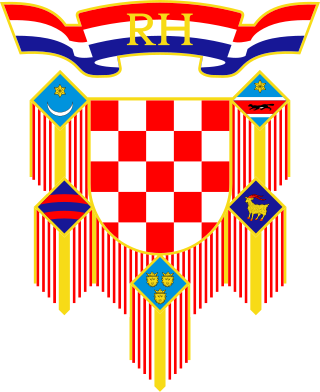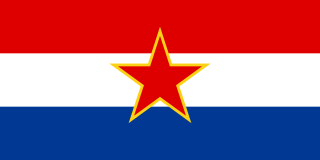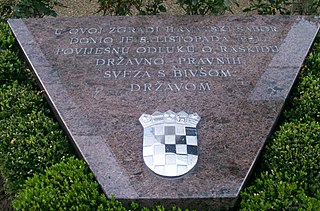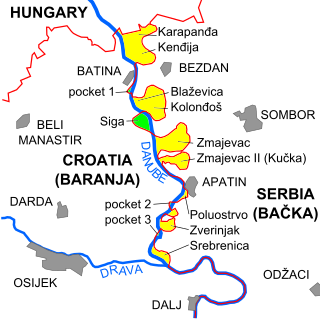Related Research Articles
The politics of Croatia are defined by a parliamentary, representative democratic republic framework, where the Prime Minister of Croatia is the head of government in a multi-party system. Executive power is exercised by the Government and the President of Croatia. Legislative power is vested in the Croatian Parliament. The Judiciary is independent of the executive and the legislature. The parliament adopted the current Constitution of Croatia on 22 December 1990 and decided to declare independence from Yugoslavia on 25 May 1991. The Constitutional Decision on the Sovereignty and Independence of the Republic of Croatia came into effect on 8 October 1991. The constitution has since been amended several times. The first modern parties in the country developed in the middle of the 19th century, and their agenda and appeal changed, reflecting major social changes, such as the breakup of Austria-Hungary, the Kingdom of Serbs, Croats and Slovenes, dictatorship and social upheavals in the kingdom, World War II, the establishment of Communist rule and the breakup of the SFR Yugoslavia.

The president of Croatia, officially the president of the Republic of Croatia, is the head of state, commander-in-chief of the military and chief representative of the Republic of Croatia both within the country and abroad. The president is the holder of the highest office in Croatia. However, the president is not the head of the executive branch as Croatia has a parliamentary system in which the holder of the post of prime minister is the most powerful person within the country's constitutional framework and everyday politics.

The prime minister of Croatia, officially the president of the government of the Republic of Croatia, is Croatia's head of government, and is de facto the most powerful and influential state officeholder in the Croatian system of government. Following the first-time establishment of the office in 1945, the 1990–2000 semi-presidential period is the only exception where the president of Croatia held de facto executive authority. In the formal Croatian order of precedence, however, the position of prime minister is the third highest state office, after the president of the Republic and the speaker of the Parliament.

The Croatian Parliament or the Sabor is the unicameral legislature of the Republic of Croatia. Under the terms of the Croatian Constitution, the Sabor represents the people and is vested with legislative power. The Sabor is composed of 151 members elected to a four-year term on the basis of direct, universal and equal suffrage by secret ballot. Seats are allocated according to the Croatian Parliament electoral districts: 140 members of the parliament are elected in multi-seat constituencies. An additional three seats are reserved for the diaspora and Croats in Bosnia and Herzegovina, while national minorities have eight places reserved in parliament. The Sabor is presided over by a Speaker, who is assisted by at least one deputy speaker.

The Constitution of the Republic of Croatia is promulgated by the Croatian Parliament.
The Government of Croatia, formally the Government of the Republic of Croatia, commonly abbreviated to Croatian Government, is the main executive branch of government in Croatia. It is led by the president of the Government, informally abbreviated to premier or prime minister. The prime minister is nominated by the president of the Republic from among those candidates who enjoy majority support in the Croatian Parliament; the candidate is then chosen by the Parliament. There are 20 other government members, serving as deputy prime ministers, government ministers or both; they are chosen by the prime minister and confirmed by the Parliament (Sabor). The Government of the Republic of Croatia exercises its executive powers in conformity with the Croatian Constitution and legislation enacted by the Croatian Parliament. The current government is led by Prime Minister Andrej Plenković.

The Socialist Republic of Croatia, commonly abbreviated as SR Croatia and referred to as simply Croatia, was a constituent republic and federated state of the Socialist Federal Republic of Yugoslavia. By its constitution, modern-day Croatia is its direct continuation.

The President of the Federal Executive Council was the head of government of the Socialist Federal Republic of Yugoslavia, from the adoption of the 1963 constitution until the complete breakup of the country in 1992. Most non-Yugoslav sources referred to the post as "Prime Minister."
Croatia held an independence referendum on 19 May 1991, following the Croatian parliamentary elections of 1990 and the rise of ethnic tensions that led to the breakup of Yugoslavia. With 83 percent turnout, voters approved the referendum, with 93 percent in favor of independence. Subsequently, Croatia declared independence and the dissolution of its association with Yugoslavia on 25 June 1991, but it introduced a three-month moratorium on the decision when urged to do so by the European Community and the Conference on Security and Cooperation in Europe through the Brioni Agreement. The war in Croatia escalated during the moratorium, and on 8 October 1991, the Croatian Parliament severed all remaining ties with Yugoslavia. In 1992, the countries of the European Economic Community granted Croatia diplomatic recognition and Croatia was admitted to the United Nations.

The Parliament of Yugoslavia was the legislature of Yugoslavia. Before World War II in the Kingdom of Yugoslavia it was known as the National Assembly, while in the Socialist Federal Republic of Yugoslavia the name was changed to Federal Assembly. It functioned from 1920 to 1992 and resided in the building of the House of the National Assembly which subsequently served as the seat of the Parliament of Serbia and Montenegro and since 2006 hosts the National Assembly of Serbia. The Federal Assembly was the highest organ of state power and the only branch of government in the country, with all state organs subservient to it under the principle of unified power as it was a one-party state, with the League of Communists of Yugoslavia as the sole legal party in the country. Most of the Federal Assembly's actions simply rubber stamp the party's decisions.

The Security and Intelligence Agency is the Croatian security and intelligence service founded in 2006 upon the passing of the Security and Intelligence System of the Republic of Croatia Act and by combining the former Counterintelligence Agency (POA), and the Intelligence Agency (OA) which both ceased to operate.

Elections were held on municipal, provincial, republican and federal levels in Yugoslavia from its foundation in 1918 throughout its breakup in 1992.

The independence of Croatia was a process started with the changes in the political system and the constitutional changes in 1990 that transformed the Socialist Republic of Croatia into the Republic of Croatia, which in turn proclaimed the Christmas Constitution, and held the 1991 Croatian independence referendum.

Leon Geršković was a Croatian-Jewish lawyer, legal scholar, newspaper editor, professor, and politician.

Independence Day is a memorial day in Croatia, marked yearly on 25 June that celebrates the decision of the Croatian Parliament to declare the independence of Croatia from the SFR Yugoslavia. From 2002 to 2019, the day was celebrated as a public holiday on October 8; as of 2020 it is not considered a public holiday.

The border between Croatia and Serbia in the area of the Danube is disputed, an important part of their broader diplomatic relations. While Serbia claims that the thalweg of the Danube valley and the centerline of the river represents the international border between the two countries, Croatia disagrees, claiming that the international border lies along the boundaries of the cadastral municipalities located along the river—departing from the course at several points along a 140-kilometre (87 mi) section. The cadastre-based boundary reflects the course of the Danube which existed in the 19th century, before anti-meandering and hydrotechnical engineering works altered its course. The area size of the territory in dispute is reported variously, up to 140 km2.
The 2nd Executive Council of the People's Republic of Croatia was that state's executive organ of government from 1953 to 1958. The Executive Council was voted in at a joint session of the Republican Council and the Council of Producers on 18 December 1953.
The 3rd Executive Council of the People's Republic of Croatia was the state's executive organ of government from 1958 to 1963. The Executive Council was voted in at a joint session of the Republican Council and the Council of Producers on 10 April 1958.
The Government of Croatia and the Holy See have signed four bilateral agreements and a protocol. Although the agreements proved controversial owing to great one-time and continuous financial and other burdens the agreements put on the Croatian state, no government of Croatia ever attempted to amend them. From the perspective of international law, these agreements may be seen as unjust to Croatia because of putting obligations chiefly on the Croatian state, but not on the Holy See.
The Socialist Republic of Croatia, one of the constituent countries of the Socialist Federal Republic of Yugoslavia had gone through a number of phases in its political life, during which its major political characteristics changed - its name, its top level leadership and ultimately its political organization.
References
- ↑ Bukvić 2012, p. 15.
- ↑ Petranović & Zečević 1988, p. 1028.
- 1 2 Štambuk-Škalić 2002, p. 87.
- ↑ Bukvić 2012, p. 12.
- ↑ Štambuk-Škalić 2002, p. 90.
- ↑ Štambuk-Škalić 2002, p. 96.